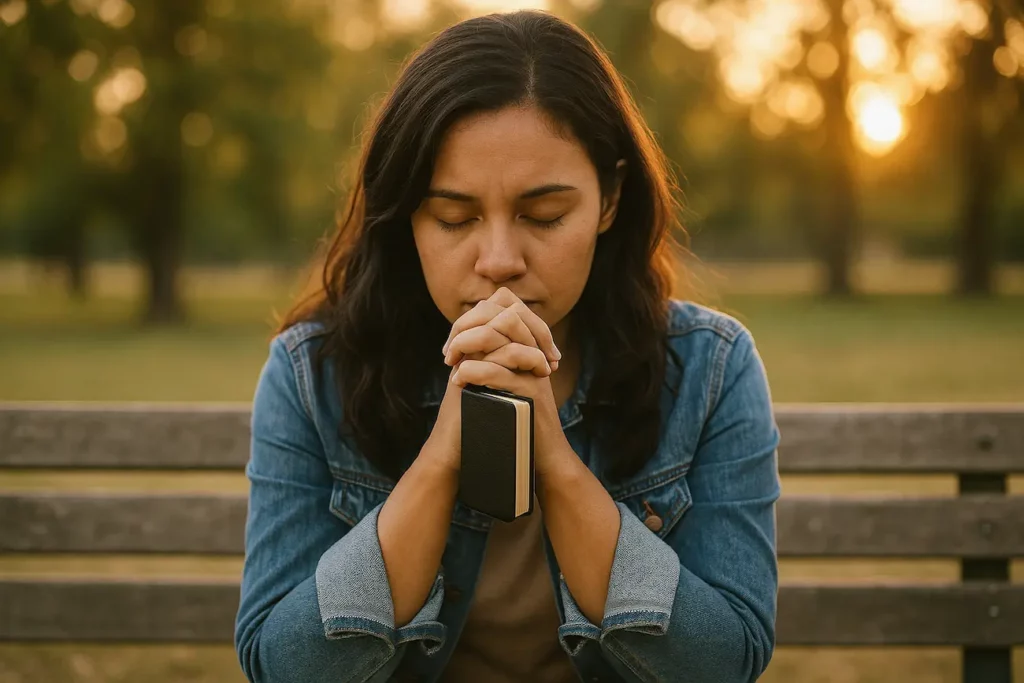
Faith as a pillar of resilience in times of adversity
The transformative power of faith can bolster resilience in adversity, revealing surprising ways belief shapes strength and recovery—discover what lies beneath.

Personal faith journeys often begin quietly, shaped by family, culture, and early experiences. Over time, doubts, questions, and life’s challenges test beliefs in unexpected ways.

But what does a personal faith journey really look like, and how can navigating it deepen connection, meaning, and understanding?
Let’s explore.
Faith, often linked to religious belief, is more than doctrine. At its core, faith is trust, conviction, and a deep sense of meaning that guides us through uncertainty.
In religion and spirituality, sacred texts, belief systems, and faith practices offer structure, while personal rituals and spiritual symbols nurture a divine connection.
This living relationship with faith cultivates inner peace, strengthens purpose, and acts as a moral compass in everyday life.
Early influences on spiritual beliefs often begin in childhood, shaping how we see the world and understand faith. Family traditions, parental guidance, and early teachings blend with cultural values and community rituals to form the base of a child’s spirituality.
Over time, religious symbols, trusted spiritual mentors, and meaningful formative experiences reinforce these early influences on spiritual beliefs, guiding personal growth and deepening one’s connection to religion.
As we mature, the lessons learned in youth continue to resonate, showing how early influences on spiritual beliefs can shape a lifelong spiritual journey.
Moments of doubt and questioning often arise during major life changes, personal crises, or when new ideas challenge old beliefs.
These moments of doubt can be sparked by loss, disappointment, or exposure to different religious or spiritual perspectives.
In a spiritual journey, moments of doubt are not failures—they are invitations to reflect, reassess, and deepen one’s relationship with faith.
How does community influence an individual’s faith development? Community plays a vital role in faith development by offering encouragement through shared experiences, group worship, and meaningful rituals.
Faith mentors and accountability partners guide growth, while service projects and social justice efforts deepen commitment and purpose.
Interfaith dialogue broadens perspective, fostering understanding and compassion.
In this supportive environment, faith development flourishes through real connection, consistent practice, and active participation.
Together, these elements create a nurturing space where spirituality matures, and faith development becomes a lifelong journey rooted in community.
While community offers a helpful framework for faith development, it’s personal reflections on life events, struggles, and moments of clarity that truly shape belief over time.
These individual journeys create unique spiritual perspectives, allowing people to shape belief in ways that feel authentic—beyond communal teachings or traditions—so their religion and spirituality become more personal and meaningful.
Navigating crisis and spiritual growth can feel overwhelming, but it also opens the door to deep transformation.
During crisis reflection, people often discover faith resilience, learning to adapt and uncover meaning amid uncertainty. This reassessment of values and beliefs can spark spiritual growth, guiding personal transformation and strengthening one’s connection to the divine.
Why do individuals turn to diverse religious traditions in their search for meaning and connection? Exploring different religious traditions helps people understand cultural rituals, sacred texts, and religious symbols in an accessible way.
These practices offer guidance, ethical teachings, and a sense of belonging. By engaging with spiritual leaders and faith practices, many discover community support, outreach opportunities, and meaningful pilgrimage experiences.
Interfaith dialogue also enhances respect and learning, showing how different religious traditions can coexist and enrich personal faith journeys. For anyone curious about spirituality, exploring different religious traditions provides a clear path to deeper understanding and connection.
Engagement with various religious traditions often brings individuals to practices centered on meditation and prayer, which serve as foundational elements for many faiths.
Meditation and prayer encourage breath awareness, focused intention, and gratitude journaling that support daily spiritual growth. Many spiritual retreats emphasize the benefits of silence and simple visualization exercises, enhancing mindfulness for beginners and experienced seekers alike.
Collectively, these practices cultivate inner peace, deepen spiritual connection, and strengthen personal faith journeys. By returning to meditation and prayer regularly, people can find clarity, resilience, and a steady sense of purpose in their spirituality.
Stories of transformation and renewal are central to many faith traditions, showing how spiritual growth can change lives. On a personal faith journey, moments of transformation and renewal can spark deep reflection, healing, and a renewed sense of purpose.
These powerful experiences often lead people to reassess beliefs, build resilience, and strengthen their connection to the divine. By sharing stories of transformation and renewal, communities of faith inspire hope, encourage ongoing spiritual practices, and highlight the continual call to grow closer to God.
Faith and its relationship with science is a timeless topic that invites meaningful conversation. While faith and science often work within different methods—spiritual belief versus empirical testing—they can enrich each other when explored with openness and curiosity.
By examining faith and its relationship with science, we see how moral values, purpose, and transcendence can coexist with discovery, data, and innovation. This dialogue sheds light on spiritual wisdom, ethical decision-making, and how believers today navigate modern knowledge.
Ultimately, faith and its relationship with science encourages a balanced approach, where spiritual insight and scientific understanding work together to deepen our view of the world.
Embracing uncertainty in the spiritual path can be a powerful practice rather than a roadblock. When you accept ambiguity and trust your intuition, you invite peace and growth into your life, even as circumstances change.
On the spiritual path, cultivating hope, exploring your boundaries, and facing fears with vulnerability help you move through doubt with courage. By seeking clarity within life’s paradoxes, you deepen your understanding, strengthen resilience, and stay aligned with your faith.
The spiritual path invites you to welcome the unknown, listen within, and allow uncertainty to become a guide toward transformation.
The intersection of faith and daily life is about weaving spiritual beliefs into everyday actions with intention.
At this intersection of faith and daily life, simple rituals—like morning prayers, mindful breathing, or gratitude journaling—turn ordinary moments into sacred opportunities for reflection and peace.
When facing ethical dilemmas or moral decisions, letting personal values lead the way at the intersection of faith and daily life helps you live with clarity, compassion, and purpose.
This balanced approach deepens spiritual understanding and supports a meaningful, conscious life journey.
As individuals move forward in their spiritual paths, they encounter continuous growth and transformation that shape their beliefs and practices. Lifelong spiritual evolution invites us to pause, reflect, and celebrate spiritual milestones—those meaningful moments that deepen faith and clarify purpose.
By recognizing these spiritual milestones, seekers stay aligned with their core values while remaining open to new insights. This ongoing process encourages a dynamic relationship with one’s beliefs that adapts throughout life’s journey.
Embracing spiritual milestones three times across different seasons of life helps nurture resilience, compassion, and wisdom. In religion and spirituality, lifelong spiritual evolution is not a destination but a gentle, steady path that honors change, deepens connection, and keeps the heart open to the sacred.
Personal faith journeys are shaped by early influences, personal experiences, and the support of a spiritual community. Along the way, personal faith journeys often include doubt and honest questioning, which can deepen one’s connection to spirituality and create a more authentic relationship with the divine. By embracing uncertainty, personal faith journeys stay dynamic and relevant, blending daily life with thoughtful reflection, and even engaging respectfully with scientific perspectives. Ultimately, faith is a lifelong process of growth and transformation that fosters compassion, purpose, and meaning as people continue to walk their unique spiritual paths.

The transformative power of faith can bolster resilience in adversity, revealing surprising ways belief shapes strength and recovery—discover what lies beneath.

Many wonder how faith molds our minds and emotions, revealing surprising psychological effects that influence resilience and well-being in unexpected ways.

A deep exploration of how faith shapes moral choices reveals complexities that challenge simple answers and invite thoughtful reflection.

Understanding faith across religions reveals shared truths and unique beliefs—unlocking mysteries that connect humanity in unexpected ways. Discover more inside.

Strengthening bonds and shaping values, faith plays a crucial role in communities—discover how it influences unity and resilience in unexpected ways.

Struggling between conviction and uncertainty, faith and doubt intertwine in ways that challenge beliefs and reveal unexpected spiritual depths. Discover the paradox within.